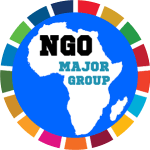April
REPORT OF NGO MAJOR GROUP AFRICA’S PARTICIPATION AT THE 4TH PARTNERS FOR REVIEW MEETING IN TBILISI; GEORGIA FROM APRIL 11 – 12, 2018
2030 Agenda review, on national, regional and global levels, shall “promote accountability to our citizens, support effective international cooperation in achieving this Agenda and foster exchanges of best practices and mutual learning. It will mobilize s ...


